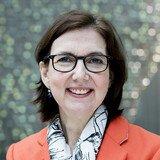
I am privileged to learn about new discoveries in mental health science every day.
I’ve seen research that could transform how we intervene in mental health, from a potential new drug to treat schizophrenia to an app to predict psychosis. These breakthroughs come from the highest standards of research, informed by people with lived experience.
As a former clinician, I was all too aware of the need for more tailored, personalised and effective treatments. We’re now closer to this than ever before. And with advances in science, such as digital tools and artificial intelligence, more innovation is on the way.
We must now find ways to test emerging and improved interventions and work with policymakers and regulators to deliver them faster and more effectively to those in need.
Funding science and collaboration to advance innovation
As an independent funder of science, Wellcome can take risks and push boundaries.
We can use our funds and our voice to create change. To maximise our impact, we focus on areas with the most potential for progress.
Our mission is to improve early intervention in anxiety, depression and psychosis. This requires new insights, new interventions and new routes to uptake.
It involves moving away from a reliance on outdated diagnostic approaches towards a rigorous analysis of specific symptoms and ‘active ingredients’ that make interventions effective.
It means forging new collaborations while building on what we know now and learning from the past.
Science alone isn't enough. We must engage policymakers and decision-makers to ensure solutions are adopted and implemented effectively.
This requires an innovation ecosystem that can turn exciting new discoveries into practical applications, especially in low-resource settings. We can do this by being agile in adopting new methods while maintaining rigorous evaluation and ethical standards.
We support this through our work with non-governmental organisations, governments, and public, philanthropic and commercial sectors.
If this has the impact we strive for, we hope to see new digital, pharmacological and non-pharmacological interventions developed and in use by 2032, including in low-resource settings, and increased recovery rates.
By fostering new relationships and advocating for new approaches, we can address mental health inequalities worldwide.
A thriving field of mental health science
We can't achieve our goals without a united and thriving field.
This requires researchers and experts from diverse backgrounds, geographies and disciplines to work together, share knowledge and prioritise lived experiences.
It calls for a shared understanding of definitions, concepts and metrics to enable clear findings and create a unified body of knowledge.
It means helping researchers identify the most promising areas for breakthroughs that could make the biggest impact.
The result will be a more collaborative, coherent and focused field, equipped with the tools and knowledge to tackle the most urgent problems in mental health.
Lasting impact in mental health
In everything we do, we aim for transformative impact.
We take risks, fund early-career researchers and support unconventional collaborations that align with our mission.
We experiment with new funding and investment approaches to meet our goals and attract new partners to join us on this journey.
By embracing innovation and challenging the status quo, we aim to push the boundaries of mental health research and treatment.
Our goal is then to ensure these innovations reach those who need them most – and ultimately transform the mental health landscape on a global scale.


